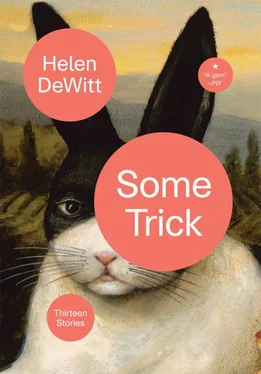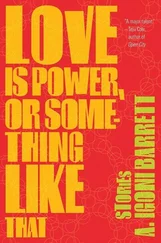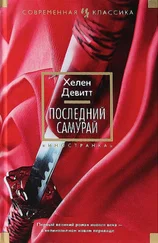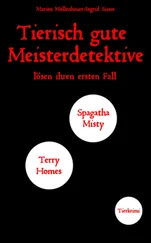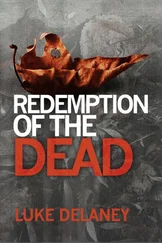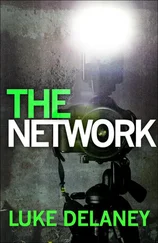Let us suppose a menu of possible tasks and rewards. A possible task is the performance of problems in algebra presented in Hungarian. The reward is a 5-tier wedding cake. (As an incentive, it beats a pootling little marshmallow into a cocked hat.)
He saw presently that it would be a mistake to try to establish a chain of schools. One is subject to so much unwelcome supervision. What was wanted, surely, was a chain of child-oriented restaurants . The sort of place where a parent could leave a child at any time day or night. Everyone cannot afford the fees for a private school. One might be able to afford a session or two a week at an educational restaurant. One might be able to send a child full-time to the restaurant while flush, then fall back on the public school system when funds ran short.
He threw himself headlong into development of the chain, which he envisaged as a crossbreed, uniting the best features of Dunkin’ Donuts, Baskin-Robbins and YO! Sushi. Within 2 years he had franchises in New York, Washington, Miami, Boston, Providence, Philadelphia, Chicago, Kansas City, San Francisco, Los Angeles, Denver, Seattle, Portland, Minneapolis/St. Paul. The Josh-only sessions proved surprisingly popular. (It was, as it turned out, possible to fill a 160-seater with Joshes.)
Rich people don’t care what happens to you.
One day he discovered, by a happy accident, that he could streamline the entourage.
He had happened to purchase a DVD of Harry Potter and the Philosopher’s Stone in Barcelona. One could watch the film, it emerged, dubbed into French, German, Dutch, Flemish, Danish, Italian, Brazilian and “Portugal” Portuguese, Spanish, Catalan, Basque, Greek, Hungarian, Turkish, Czech, Slovak, Polish, Norwegian, Swedish, Finnish, Bulgarian, Romanian! Welsh, Irish, and Scottish Gaelic! Croatian! Mandarin! Japanese, Hindi, Tamil, Punjabi, Urdu.
He sat curled up on the sofa in his hotel suite.
It’s much simpler, obviously, if each suitcase does not have to be supervised by a native speaker of the language contained in its books: one can then have, as it might be, three suitcases per person. One can manage quite nicely, for instance, with a complement of Julios and Hassans.
He put a Josh in charge of the restaurant chain. The boy had won 1,597 individually wrapped Reese’s Peanut Butter Cups, 326 chocolate oranges, 861 Eskimo Pies, 119 pints of Ben & Jerry’s Chunky Monkey, 200 5-lb bars of Hershey’s Chocolate, and 21 5-tier wedding cakes. One would hardly look to find a better qualified candidate through more conventional means of recruitment.
Readers will notice that American and British usage vary in Some Trick . Stories set in the UK follow British usage; stories set in the USA mostly follow American. However, when America is viewed through British eyes (for example, in “My Heart Belongs to Bertie”), British usage will be found.
In “Famous Last Words,” some readers might find that the use of X and x causes some confusion. The author’s unpublished novella Paper Pool makes all clear:
I never show my story to Simon. I show my story to Nick [not his real name], who says:
‘Is this about you? Who’s X, one of your boyfriends?’
‘Of course not,’ I say. ‘It’s a variable.’
‘It’s a natural thing to think.’
‘It is not a natural thing to think,’ I say. ‘The whole point is that it could be anybody. It works like a pronoun, only it gives less information, we don’t even know if the character’s M or F.’
‘Of course he’s a guy,’ says Nick. ‘It says so.’
‘It does not say so,’ I say. ‘It says X.’
‘But he’s obviously a guy. All that talk about politics.’
‘Exactly,’ I say. ‘So we see how far the reader goes beyond what’s actually there, you know how much is constructed, so that specifying corporeal properties seems to tell us something we already know.’ It occurs to me that this is a trick with all the conceptual sophistication and avant-gardist chic of The Mysterious Affair at Styles .
‘I still maintain he’s a guy,’ says Nick. ‘And how come he changes from a capital X to a small x at the end? You have to admit that’s deliberately obscure.’
‘It’s not obscure, it’s a totally different variable,’ I say. ‘You might as well say it was confusing to have a character named David and another one called Dave. And you see we never do know what little x is. The dark blue trousers are just trousers — what a great line. And so true.’
‘Hmmm,’ says Nick.
(And the equation featured in “Famous Last Words” has been drawn from Mathematical Analysis: A Special Course , by G. Ye. Shilov, translated by J. D. David, and edited by D.A.R. Wallace (Pergamon Press, Oxford).)
Rachel’s SUDO MAKE ME A SANDWICH t-shirt in “Climbers” quotes xkcd #149, “Sandwich,” with permission of Randall Munroe. Readers who would like to own this excellent t-shirt can find it at https://store.xkcd.com/collections/apparel/products/sudo.
In the Renaissance blue was an expensive pigment; a patron commissioning a painting would specify how much blue the painter was to use. Fiction today has its own prohibitively expensive pigments. Edward Tufte took out a second mortgage on his house to self-publish his spectacularly handsome first book; this meant he could marshal a crack production team. The writer who lacks his resources has a couple of options: 1, try to persuade skeptical agents to find a publisher who will provide technical support; 2, spend hundreds of hours coding, hundreds more grappling with Adobe Illustrator, and so on. “Long and winding road” and “Faint but pursuing” are my two most common e-mail subject lines. “Dear Paul, THANK you for your help with ArabTeX!” is typical content.
Over the years visitors to my blog ( paperpools.blogspot.de) have generously helped me live to fight another day. While The Last Samurai was out of print buyers of secondhand copies would send donations to the beleaguered author. More recently two dedicated readers have been thinking of ways to approach the challenge in a less haphazard manner; anyone who would like to be involved should contact me at helen.dewitt@gmx.netto be put in touch. Readers who would like to sustain an author wandering the labyrinth of Stack Overflow can buy me a coffee at https://ko-fi.com/dewitt.
“As you’re reading these 13 genius and altogether delightful short stories by Helen DeWitt, you may not have any idea where you’ll end up, but you can read assured, because the destination, however unexpected, is always a fascinating, expansively erudite thrill.”
—
Southern Living Magazine
“DeWitt reasserts herself as one of contemporary fiction’s greatest minds in this dazzling collection of stories about misunderstood genius. DeWitt’s disdain for those who seek to profit off of genius is sharp and refreshing, and her ability to deliver such astounding prose and thought-provoking stories constitutes a minor miracle. This is a gem of a collection.”
—
Publishers Weekly (starred review)
Also by Helen DeWitt
from New Directions
*
The Last Samurai
Lightning Rods
Copyright © 2018 by Helen DeWitt
All rights reserved. Except for brief passages quoted in a newspaper, magazine, radio, television, or website review, no part of this book may be reproduced in any form or by any means, electronic or mechanical, including photocopying and recording, or by any information storage and retrieval system, without permission in writing from the Publisher.
Читать дальше
